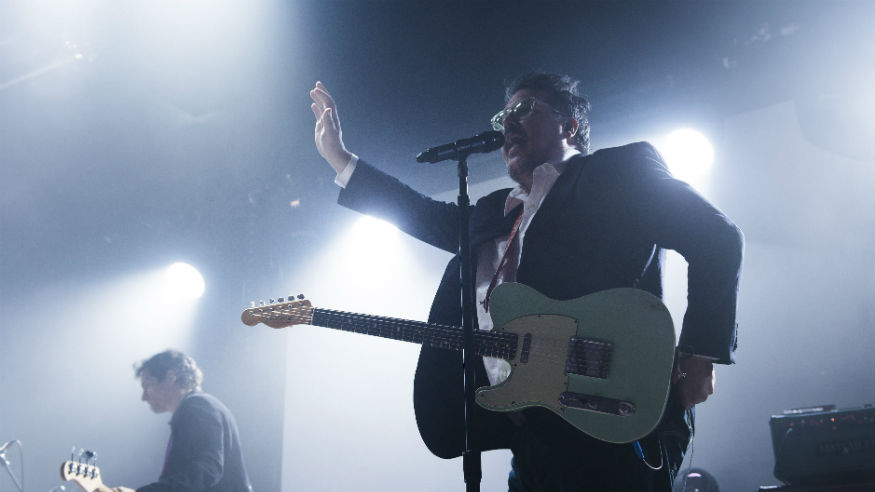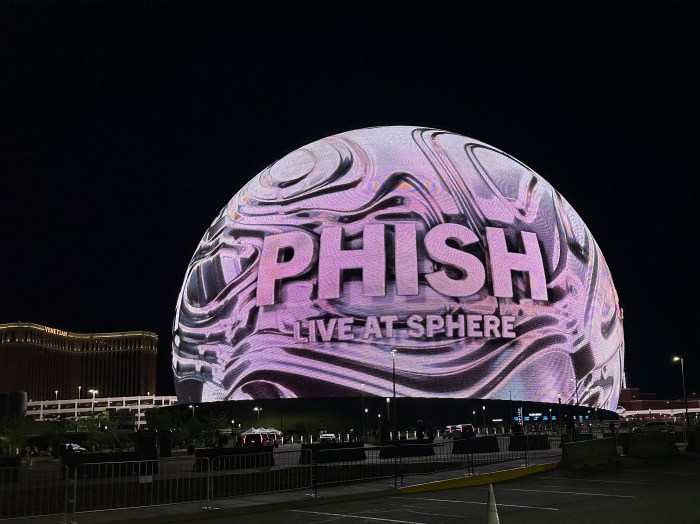They Might Be Giants may be one of the pioneers and figure heads on the theoretical Mount Rushmore of American Alternative Rock. But with with how enormously influential their career has been for many of the bands carrying on the torch of this kind of music today, their success has not been as effortless as you’d imagine. The band — comprised of the songwriting duo John Flansburgh and John Linnell — has remained blazingly prolific in their nearly 30 years as a band with this year marking the release of their twentieth album, I Like Fun.
Throughout their career, the two Johns have found ways to keep their output interesting to themselves as artists. With their Dial-A-Song project, the band would ask fans to call into a hotline — and later visit a website — in order to hear a newly recorded song each each week. They took other detours as well, creating critically acclaimed and Grammy Award-Winning children’s music and even writing for the Spongebob Squarepants musical where they were nominated for Tony.
Metro caught up with John Flansburgh to talk about the new They Might Be Giants album and what keeps inspired after all of these years.
John Flansburgh on nearly three decades of They Might Be Giants
John Flansburgh and John Linnell of They Might Be Giants. Photo: Getty Images
Congrats on your twentieth album! Did you and John ever think that They Might Be Giants would have lasted so long and with such great success?
John Flansburgh: I think when we made our 18th album, we looked up “18th albums” on wikipedia and were sort of trying to compare the quality and standard of our work to those albums. I haven’t looked up 20th albums yet. This album has been very warmly received and gotten a lot of attention and I’m not exactly sure why. Sometimes, when things go bad in the world people make a more concerted effort to seek out the thing that we are doing. I think a lot of people find it in a strange way very comforting because it’s neither cynical or simple minded. I think that combination in the times that we are living in has kind of a unique appeal. I can’t really say why. We worked hard on the record. But, we’ve worked hard on other records that have not nearly gotten as much notice. So I can’t really explain why it has done so well.
That is a funny concept. I felt that way when Randy Newman put out his album “Harps and Angels” during the Bush years. While Randy always wrote politically charged songs and channelled his anger so well, for some reason that album hit a little bit harder given the times we were living. It was like “Thanks, Randy”.
John Flansburgh: Exactly! I think songwriters and performers tend to think how their work lands really is only a reflection on them. But the longer you are on the rollercoaster of a music career, the more you realize you are building whole new parts of the rollercoaster as you are doing it. Those changes are affecting how your stuff is understood. Things change and the weight of the world informs your work.
You guys always seem to come up with different angles in terms of your songwriting craft — like your Dial-A-Song project and your kids albums — do these projects give you more inspiration to create? Is it an act of cleaning out the artistic hive?
John Flansburgh: I don’t know how to explain what we are doing to be honest. I don’t know if it is a good idea for bands to work as long as we have worked. It’s been fruitful for us and it’s been satisfying for us. It’s been a ton of fun. We get to play shows and we get to record in fancy recording studios. All of those things are like a dream come true. I’m sitting in this really pleasant tour bus right now. It’s hard for me to think that, after spending a decade in a van, ‘Oh, how can I carry on this way?’ At the same time, people have different expectations. I think some people would find it very frustrating to be caught in the middle. Which is where our career is. Things could get a little bit better and feel a LOT better for us. To be perfectly honest. Half the time we’re still playing in clubs and that’s a different reality than playing in theaters. Playing in theaters is a much more comfortable place to be professionally. I don’t like to complain. But, I will if you’d like to hear it!
In terms of writing and recording — What keeps you inspired these days?
John Flansburgh: That’s a good question! We really love the song as a platform for musical exploration. There’s a lot of things that can be done in a song form that aren’t really worthy of being bigger than that. I think the song is a really efficient way to deliver musical ideas. You can deliver some very fragile and unjustifiable ideas in a song and it can be very satisfying for the listener and be a very interesting thing to write. But if it went on any longer or approached it a different way, it would just seem kind of pompous.
We have this song [“McCafferty’s Bib”] on the second side of the new album that has all of microtonal chords in it. John has this microtonal fixation. I’m a little bit more skeptical of how awesome micronality is. Although, it’s an interesting fresh breeze when you do it. We did this interesting musical handoff where he gave me a bunch of chords in a microtonal form. I feel like that with the way it’s dealt with in the track is actually super vivid and not exactly hard on the ears. It’s a fun musical song. But, it’s sort of dragging in something that you would probably only hear in an art music setting. I don’t know of any popular music being made with microtonality right now. I guess we get a little bit of pleasure being a cultural Trojan Horse. We can bring in ideas that don’t happen even on the left hand side of the dial!
Kind of like musical inside jokes or specific projects that get you excited?
John Flansburgh: I wouldn’t consider them “inside jokes”. I was listening to a discussion on the radio about creativity and they were talking about Raymond Loewy who was a very famous 20th century graphic designer and industrial designer. He invented the concept of streamlining. He was a pretty heavyweight creative dude. He had this little credo, I’m going to paraphrase him, “do the most original work that will be popularly embraced”. Which is such an interesting push-pull of what seems like almost contradictory impulses. As a designer, your audience is the general public. So you do have to think about how it’s going to land in the world. If you are going to make successful design it’s got to be accepted by people.
I think at our best, our work has a kind of musical ambition whether it’s in the lyrics or how the songs is structured or the instrumentation or just the general point of view. There is something ambitious going on and at it’s best I think it really does kind of bring something more challenging to contemporary songwriting than you would find in most places. But the thing is, people have to like it to! That’s the thing that’s so weird. We are in a pop band! I have nothing but respect for people who are heavily involved in improvisation, experimental music, or electronic music. Those things are very interesting to me. Even like dance music or deeper hip hop tracks that are using all of the tools in electronic music right now are very exciting things. But, bringing those tools to our audience could very quickly be a tune out for them. There’s a lot of great music that doesn’t have any place on the radio. I guess in some way we still feel that we are still vying to have a toehold on the alternative stations of the world.
It seems like there are usually two paths that a band can take when it lasts this long — either touring as a legacy act or addressing aging in thoughtful ways. You guys definitely did that on I Like Fun especially on the song “Last Wave”. Was addressing mortality in your minds this time around? Or, is it always the main question of life?
John Flansburgh: Well, those are big ideas and questions that are all looming over us. I think from a distance, I can imagine a lot of people think that we’re just kind of carrying on with the thing that we are doing. We haven’t done the thing that a lot of acts have done where they go through a really active period of reinvention. I don’t know why it’s been more of an evolution than a “remake rethink model” with us. Again, I think it sort of circles back to how durable songwriting is and how plastic, in the best sense of the word, it is.
In terms of just carrying on, it’s a question that has been asked a bunch this year so I’ve thought about it more than usual. I think that because we started the band essentially as young adults and not teenagers and we’re not big partiers and we’re kind of self-serious about what we’re doing, we’ve carried on in sort of a middle class way. It’s not ambition that has driven us as much as it has been a manageable job. It’s something that we are good at doing and we know how to do it. We’ve found an audience. It’s so unusual to find an audience and so unusual for an audience stick with you! We’ve had so many different levels of good luck over the years it’s hard to even say what the secret of our longevity is. I think the fact that we didn’t have one breakout novelty hit that branded us in a time and place. That’s a difficult situation that is sort of unfortunate.
When success becomes the first chapter in what is ultimately ber perceived as failure (laughs). I think that, in a strange way, by kind of stumbling along without crazy breakthrough success we have avoided being officially of a time and place. It’s funny to see bands that started 15 years after we had who are essentially frozen in amber in a musical moment and have a hard time getting out for under that.
They Might Be Giants where one of the pioneers of bands moving to Brooklyn back in the day. Is it sad to see that this might be a thing of the past in a few years?
John Flansburgh: The thing about New York and the city in general is that everything is always changing. Sometimes it is changing for the better and sometimes it is for the worst. When I talk to people who lived in the East Village before it blew up, it’s kind of the same story. New Yorkers are completely hypnotized by the idea of New York real estate. It’s so often just the main topic. When you get down to it, it’s such an inhospitable place to live that all everyone talks about is how to get through their apartment lives without going insane.
Brooklyn has changed tremendously since we started and I enjoy being in kind of a quieter place. I enjoy being the loudest thing in a quiet place rather than a loud thing among a bunch of really loud things. Brooklyn was definitely that in the 80’s and 90’s. It was such an obscure place! If I ran into somebody under 40 getting off at my stop on the subway I would stop that person and say “Hey, we should get to know each other! We both live in this very underpopulated neighborhood and all of the other people around here are in AARP. Maybe we should hang out?” That is certainly not the case anymore. It’s just wall to wall artisanal everything. It doesn’t make me sad. It’s better that than crack vials and drug rehab centers. Cities have to go one way or the other. If it’s fancier than it was, it’s probably better than being worse.
They Might Be Giants wrote some music for the Spongebob musical, would you consider writing more for Broadway or even writing your own musical?
John Flansburgh: A bunch of years ago, my wife wrote a musical that I was involved in and it was a pretty interesting experience. It was a real eye opener in terms of how those collaborations work. One thing that would be tricky for us, is that when you are in a rock band you very quickly lose track of how much control you have over what you are doing. In a way, we are enjoying a lot of the certain cultural victories that Jackson Browne and the Rolling Stones won for rock bands in the 70’s. Those are just kind of random example. But, the whole idea of controlling your project from top to bottom is something that is really understood in the world of rock music and it’s completely rejected in the world of films, television, and broadway musicals. You can say you created a show, but there is an army of people behind you that would not only actively disagree but some of them are much closer to having the final word on how things will go than the originator of the idea.
I guess that’s a very long winded way of saying that I’m very scared of situations where you have a choice between seeming like a control freak and completely ceding creative control over something that you are working on. It’s a tricky thing. We’re affable people! We’ve done a lot of work in advertising and we’ve done a fair amount of work in television. In both of those things, you are working for a client. There’s a person you are delivering a thing to and our job is to make them happy with the thing we are putting together. The broadway thing just seems so overly complicated to me. People get lost. The shows take so long to put together. Everything moves so slowly. In 2018 we are going to be releasing 4 new full length album projects, because we are putting out a new song every week with this dial a song project. What’s great about the way we are working inside the world is that nothing is slowing us done. We get to do the thing we are doing. It takes a lot of time and a lot of energy and we are very critical of what we are doing. At the same time, we can be very productive. My dream would be to be involved in a really interesting creative animated film. I would love to work in that realm because I’m a big fan of animation and the graphic arts. But I do wonder, if it would be this crazy time suck (laughs).
You can catch John Flansburgh and They Might Be Giants at New York’s Terminal 5 on Saturday October 27th and at Philly’s Theater of Living Arts on New Year’s Eve. Head over to theymightbegiants.com/shows/ for more tour dates.




















